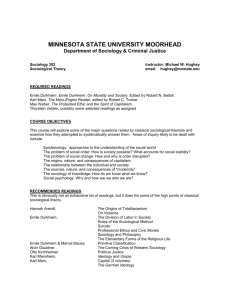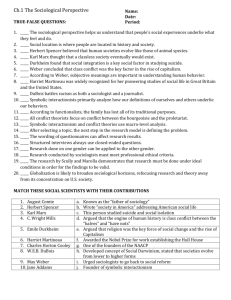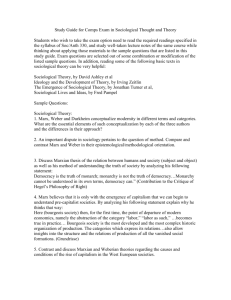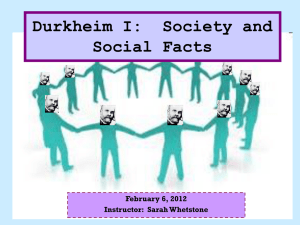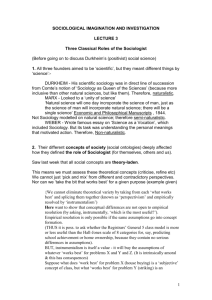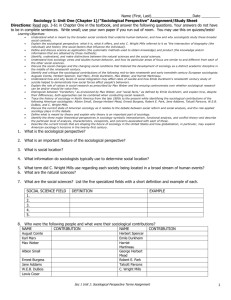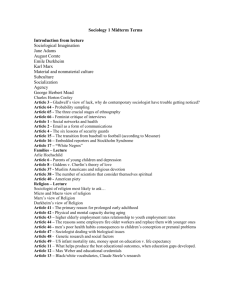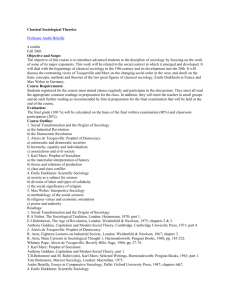Soc 510: Fall 2013 Sharon Hays SOC 510, Fall 2013 Classical
advertisement
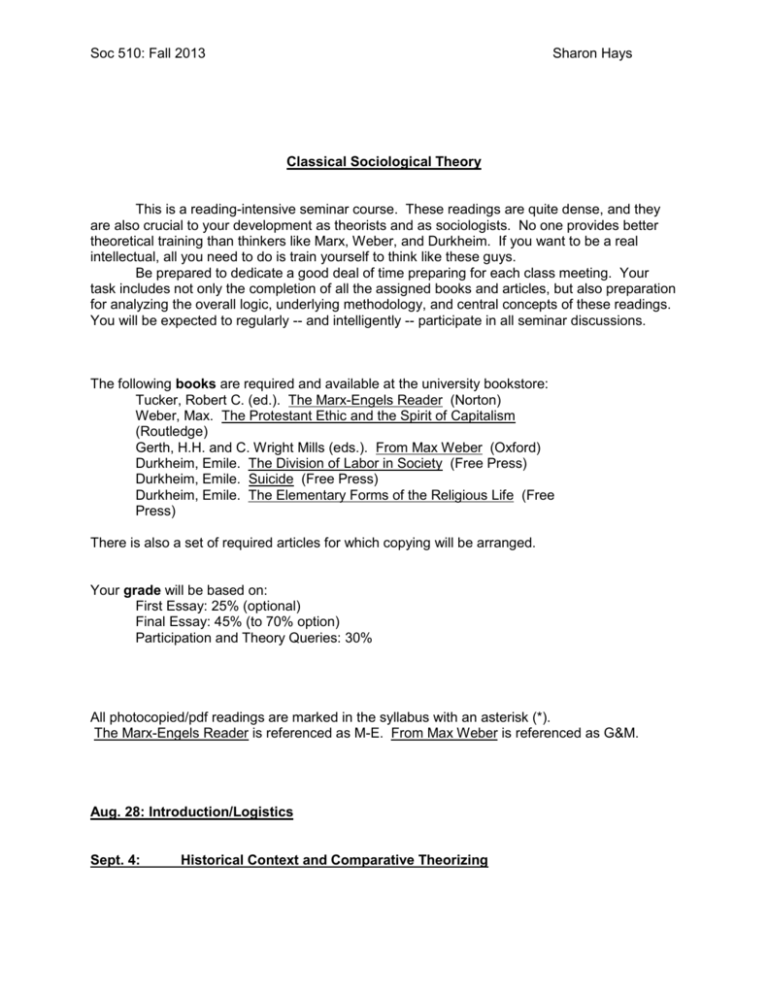
Soc 510: Fall 2013 Sharon Hays Classical Sociological Theory This is a reading-intensive seminar course. These readings are quite dense, and they are also crucial to your development as theorists and as sociologists. No one provides better theoretical training than thinkers like Marx, Weber, and Durkheim. If you want to be a real intellectual, all you need to do is train yourself to think like these guys. Be prepared to dedicate a good deal of time preparing for each class meeting. Your task includes not only the completion of all the assigned books and articles, but also preparation for analyzing the overall logic, underlying methodology, and central concepts of these readings. You will be expected to regularly -- and intelligently -- participate in all seminar discussions. The following books are required and available at the university bookstore: Tucker, Robert C. (ed.). The Marx-Engels Reader (Norton) Weber, Max. The Protestant Ethic and the Spirit of Capitalism (Routledge) Gerth, H.H. and C. Wright Mills (eds.). From Max Weber (Oxford) Durkheim, Emile. The Division of Labor in Society (Free Press) Durkheim, Emile. Suicide (Free Press) Durkheim, Emile. The Elementary Forms of the Religious Life (Free Press) There is also a set of required articles for which copying will be arranged. Your grade will be based on: First Essay: 25% (optional) Final Essay: 45% (to 70% option) Participation and Theory Queries: 30% All photocopied/pdf readings are marked in the syllabus with an asterisk (*). The Marx-Engels Reader is referenced as M-E. From Max Weber is referenced as G&M. Aug. 28: Introduction/Logistics Sept. 4: Historical Context and Comparative Theorizing 2 SOC 510, Fall 2013 * Poggi, Gianfranco. "Lego Quia Inutile: An Alternative Justification for the Classics." pages 3947 in Social Theory and Sociology, edited by Stephen P. Turner. Blackwell 1996. * Hobsbawm, E.J. "Introduction," "The World in the 1780s," "Conclusion: Towards 1848." pages 17-43, 349-362 in The Age of Revolution, 1789-1848. New American Library, 1962. * Nisbet, Robert A. "The Two Revolutions." pages 21-44 in The Sociological Tradition. Basic Books, 1966. Sept. 11: Marx I: "Ruthless Critique" Contribution to the Critique of Hegel's Philosophy of Right: Introduction M-E pages 53-54 On the Jewish Question M-E pages 26-46 Economic and Philosophic Manuscripts of 1844 M-E pages 70-101 Theses on Feuerbach M-E pages 143-145 Sept. 18: Marx II: Economy, Culture, and Politics The German Ideology M-E pages 148-166, 172-174, 176-200 Manifesto of the Communist Party M-E pages 473-491, 499-500 Preface to A Contribution to the Critique of Political Economy M-E pages 3-6 Sept. 25: Marx III: The Logic and Dynamics of Capitalism Wage Labor and Capital M-E pages 203-217 Capital M-E pages 302-438 First Essay (optional) Assigned: Sept. 25 3 SOC 510, Fall 2013 Due: Oct. 17 by 4:30 pm Oct. 2: Weber I: Capitalism, Domination, Culture, and Religion The Protestant Ethic and the Spirit of Capitalism from Author's Introduction - thru end of: IV. Religious Foundations, sect. A) xxviii-80; 102-125 Oct. 9: Weber II: Domination, Authority, and Bureaucracy * The Definition of Sociology page 4 in Economy and Society, edited by Guenther Roth and Claus Wittich. University of California Press, 1978. * Types of Social Action pages 24-26 in Economy and Society. * Power and Domination pages 53-54 in Economy and Society. * The Types of Legitimate Domination pages 212-216 in Economy and Society * Bureaucracy and Political Leadership pages 1393-1403 in Economy and Society Bureaucracy G&M pages 196-209, 214-230 Discipline and Charisma G&M pages 262-264 * The Nature and Impact of Charisma pages 1111- 1117, 1121-1123 in Economy and Society * Socialism pages 191-219 in Max Weber: The Interpretation of Social Reality, edited by Elridge. Michael Joseph, London, 1971. Oct. 16: FREE DAY!!! - NO CLASS/ MIDTERMS DUE 17th J.E.T. 4 SOC 510, Fall 2013 Oct. 23: Weber III: Culture and Social Hierarchy The Social Psychology of the World Religions G&M pages 267-301 Class, Status, and Party G&M pages 180-195 Oct 30: Weber IV: Ethical Philosophy, Science, and Politics Politics as a Vocation G&M pages 115-128 Science as a Vocation G&M pages 129-156 * "Objectivity" in Social Science and Social Policy excerpts, pages 49-63, 92-97, 111-112 in The Methodology of the Social Sciences, edited by Edward A. Shils and Henry A. Finch. Free Press, 1964. Nov. 6: Durkheim I: Solidarity and Anomie The Division of Labor in Society Book I: Ch. 1 (11-17, 22-29) Ch. 2 (first paragraph on p. 31, bottom of 38-47, 60-64) Ch. 3 (68-72, bottom of 81-87) Ch. 5 (101-106, 118-123) Ch. 7 (149-165, 172-74) Book II: Ch 5 (283-287) Book III: Ch. 1 (entire: 291-) Ch. 2 (entire: 310-) Conclusion (entire: 329-) Preface to 2nd Edition (entire: xxxi-) * "Individualism and the Intellectuals" pages 43-57 in Emile Durkheim on Morality and Society, edited by Robert University of Chicago Press, 1973. Nov. 13: Durkheim II: The Individual and Society Bellah. 5 SOC 510, Fall 2013 Suicide Preface (entire: 35-) Introduction (entire: 41-) Book Two: Ch. 1 (entire: 145-) Ch. 2 (entire: 152-) Ch. 3 (first paragraph on 171, 201-216) Ch. 4 (entire: 217-) Ch. 5 (entire: 241-) Book Three: Ch. 1 (entire: 297-) Ch. 2 (332-338) Ch. 3 (386-392) Nov. 20: Durkheim III: Culture and Society The Elementary Forms of the Religious Life Introduction (entire: 1-) Book II: Ch. 7 (entire: 207-) Book III: Ch. 1 (entire: 303-) Conclusion (entire: 418-) * "The Dualism of Human Nature and Its Social Conditions" pages 325-340 in Essays on Sociology and Philosophy, edited by Kurt H. Wolff. Harper Torchbooks, 1960. Nov 28: Happy Turkey Day. Dec. 5: Catch-up, Comparisons and other Conversations (our spill-over day, and time for "big picture" discussions.) Final Essay Assigned: November 13 Due: Friday, December 13, by 3:00 pm [no extensions !] Secondary Sources None of these readings are required. In fact, it's a great idea to just read the classical theorists without any "outside help, since they stand on their own and are also subject to multiple interpretations. of course, there are many, many additional secondary sources beyond those listed here. but, be careful. everyone is an "expert" on the classical theorists (and many of them look to me SOC 510, Fall 2013 6 like snake oil salesmen). I want you to avoid becoming a clone of the experts; instead, dream of developing your own interpretation of these classical theorists of society. General Overviews of the Classical Sociological Tradition Raymond Aron, Main Currents in Sociological Thought Anthony Giddens, Capitalism and Modern Social Theory Robert Nisbet, The Sociological Tradition Gianfranco Poggi, Images of Society Bryan S. Turner, Classical Sociology Randall Collins, Three Sociological Traditions Talcott Parsons, The Structure of Social Action Steve Seidman, Liberalism and the Origins of European Social Theory Herbert Marcuse, Reason and Revolution Lewis Coser, Masters of Sociological Thought Jeffrey Alexander, Theoretical Logic in Sociology George Ritzer, Sociological Theory Krishan Kumar, Prophecy and Progress The Classical Tradition in Contemporary Context R.W. Connell, "Why is Classical Theory Classical?" American Journal of Sociology 102 (6): 1511-1557 R.W. Connell, Southern Theory: The Global Dynamics of Knowledge in Social Science Steven Siedman, Contested Knowledge: Social Theory in the Postmodern Era Stephen P. Turner (editor), Social Theory and Sociology: The Classics and Beyond Charles Lemert (editor), Social Theory: The Multicultural and Classic Readings Other Sources Marx George Lichtheim, Marxism Shlomo Avineri, The Social and Political Thought of Karl Marx Leszek Kolakowski, Main Currents in Marxism Henri Lefevre, The Sociology of Marx Louis Althusser, For Marx Weber Reinhard Bendix, Max Weber: An Intellectual Portrait Frank Parkin, Max Weber Bendix and Roth, Scholarship and Partisanship: Essays on Max Weber Gianfranco Poggi, Calvinism and the Capitalist Spirit Roth and Schluchter, Max Weber's Vision of History SOC 510, Fall 2013 Durkheim Gianfranco Poggi, Durkheim Robert Bellah, Introduction to Emile Durkheim on Morality and Society Steven Lukes, Emile Durkheim: His Life and Work Robert Nisbet, The Sociology of Emile Durkheim Dominick LaCapra, Emile Durkheim: Sociologist and Philosopher 7

